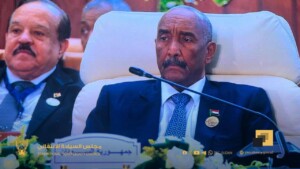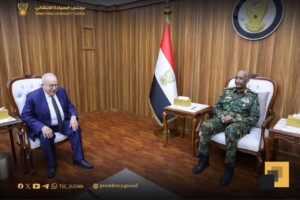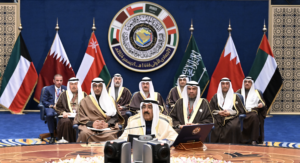‘AUHIP should heed collapse of Sudan peace roadmap’: think-tank
According to the Sudan Democracy First Group, the AU panel mediating between Khartoum and the Sudanese opposition should intervene to prevent a new deadlock in the peace talks.
After a six-month gap of direct meetings between the Sudanese government and the country’s holdout rebel movements, the African Union High-level Implementation Panel (AUHIP) has resumed its efforts in reaching a comprehensive peace in the country.
In response to the plans of AUHIP head Thabu Mbeki to visit Khartoum this month, the Sudan Democracy First Group (SDFG), a Kampala-based think-tank of Sudanese intellectuals within Sudan and abroad, issued a statement on Friday in which it advises AUHIP to heed the possibility of a new deadlock.
In March 2016, AUHIP presented a roadmap for reaching a peaceful solution for the political crisis in Sudan to Khartoum and the Sudanese armed and political opposition. The opposition leaders operated under in the Sudan Appeal, a two-page document calling for democracy and regime-change, signed in December 2014. The roadmap agreement was immediately signed by the Government of Sudan. The Sudan Appeal forces agreed to sign the document in July.
The first steps proposed by the roadmap collapsed within less than a week of its launching, because the Sudanese government did not announce a cessation of hostilities agreement for humanitarian purposes in the Sudanese war-zones: Darfur and the Two Areas (South Kordofan and Blue Nile).
“The demonstrated ill intentions of the ruling party towards the roadmap were followed by a set of actions that indirectly aimed to abandon and slay the AUHIP roadmap,” the SDFG statement reads.
According to the think-tank, these actions include:
– The ruling National Congress Party’s (NCP) insistence to move ahead in its isolated National Dialogue and announcement of its conclusion and recommendations made, though these were even rejected by political forces allied with the regime;
– The dissolution of the 7+7 National Dialogue Mechanism which was mandated to take part in the preparatory meeting with the opposition forces, and replacing it by a new committee that show features of the ruling party’s partners in the new government;
– Beginning consultations and preparations to form a new government with “those present amongst NCP allies”;
– Proposing and passing a score of constitutional amendments reflective of the ruling party’s interests, while “leaving out the interests of the real Sudanese political and civil agencies”;
– Working on a Permanent Constitution without adhering to internationally recognized practices in constitution making, and excluding a number of national parties, while “ignoring the conditions for a conducive environment needed for such a [..] new constitutional process”.
Political environment
In addition, the SDFG states, AUHIP and Mbeki are facing a dilemma concerning new developments in the Sudanese political environment. “New developments and facts that are facing AUHIP include among others:
– Broad civil disobedience witnessed recently in Sudan, which reflected a wide popular rejection of the ruling party’s policies;
– Escalating violence in Jebel Marra, leading to a large and steady flow of displaced following ongoing military campaigns;
– Continued military campaigns in South Kordofan and Blue Nile, and the increasing role of government militias in the attacks;
– Repeated unilateral declarations of ceasefire without monitoring mechanisms, “turning them into mere lip services, while government military campaigns continue relentlessly”.
– Increasing rejection of AUHIP methods and interaction by a number of important and influential actors such as the National Consensus Forces, the Sudan Liberation Movement-headed by Abdelwahid El Nur, and a number of refugees and displaced organisations. AUHIP’s negligence to these forces gravely erodes and obstructs any future solutions.”
Humanitarian aid
According to the Sudanese think-tank, the “challenges and complexities of the Sudanese crisis were further increased with a proposal made by the outgoing US administration”, end of last year, to undertake (limited) humanitarian delivery by USAID to the Two Areas after clearance of Sudan’s security institutions.
“This would give the ruling regime actual control over humanitarian access and the chance to use it as a political pressure tool, “the SDFG says, agreeing here with the stance of the Sudan People’s Liberation Movement-North (SPLM-N) towards the US proposal.
“The proposal, which was void of practical implementation measures, identified relevant humanitarian assistance as medicines, drug supplies, and medical equipment. This proposal does not differ from the government’s proposal, which insists on humanitarian delivery through Khartoum, without making any reference to external routes of medical evacuation or delivery of other humanitarian assistance such as food, educational aids, seeds, and farming tools among other needs of the displaced.
“The proposal of the former US administration is a setback from the previous position agreed to by the Sudanese government. The Government of Sudan agreed in previous negotiations round sponsored by AUHIP that humanitarian assistance can be delivered through neighbouring countries provided they undergo inspection in Ed Damazin and Kadugli [capitals of Blue Nile and South Kordofan]. Moreover, the proposal made no reference to war-affected areas controlled by the government, where displaced are denied registration and humanitarian assistance.
“It was obvious from the haste, ambiguity and the pressure exerted on the opposition to accept the proposal that the outgoing US Administration aimed at achieving an internal political victory before leaving the White House within the context of legitimising its decision of easing economic sanctions against the Sudanese regime, and frame a stand in which the opposition consent to the de-isolation of the regime, despite its continued crimes, wars, corruption, and repression of freedoms.”
Challenges and opportunities
According to the SDFG, AUHIP is facing “several great challenges but also potential opportunities, in order to enhance its performance and ability to integrate all Sudanese actors, to ultimately achieve a just and peaceful democratic transformation”. It should:
“Search for more effective ways to hold the Sudanese government accountable to its obligations as provided for in AUPSC Communiqué’s 456 and 539, especially in relation to confidence building measures and conducive environment. Implementation of content of these resolutions shall lay the foundation needed for a peaceful political process which sets an ending to war and avails freedoms and the launching of a comprehensive and genuine constitutional dialogue.
“Emphasise the need to coordinate the political solution and ending war tracks to reach a comprehensive and durable solution to the Sudanese crises. Past experiences have drastically failed due to sacrificing democratic transformation for peace- making, and only addressed the crisis at the surface level instead of tackling its root causes.
“Revisit its structure and methodology in order to become more effective and responds actively to issues under consideration. In this regard, AUHIP may be called to expand its structures and bodies and to seek, in a formal and real manner within its official and institutional structures, expertise of Sudanese specialists and academicians as well as civil society to work in the core of its daily advisory and executive business. This will feed Sudanese daily life into the Panels’ understanding, approach and make its proposals more accepted and appropriated broadly in the Sudanese context, and for different Sudanese political and civil forces.
“Expand its international and regional partners, from neighboring and European countries, and to officially get the assistance of parties concerned with Sudan. Moreover, regional, and international organizations i.e. EU, the Troika, and the UN must be clearly and tangibly involved in the operations of the Panel, as they have significant pressure capabilities. Creating a formal AUHIP partners’ forum may bring a new energy and power to the panel multiple roles.
“Affirm its presence on the ground by having permanent staff and representatives in Khartoum, amongst refugees and displaced, and within the diaspora with exiled opposition. A major cause for political and civil opposition’s loss of confidence in the Panel was the seasonality of meeting with these influential powers. Stable presence and representation of the Panel on the ground enhances its ability to get first-hand information and get engaged with socio- political realities of the Sudanese crisis.
“Adopt a clear approach on how to deal equally with all parties to the Sudanese conflicts. Being aware that the apparent rapprochement with the ruling NCP as the de facto government, compared to lesser interaction with other opposition forces, tarnishes its image with many negatives, as it portrays the Panel and President Mbeki to be silently or tacitly endorsing organised and continuous crimes committed by the regime throughout the past 27 years since it took over power through a coup in 1989,” the statement concludes.
The SDFG is a coalition of democrats, activists, trade unionists, and academic Sudanese men and women representing different cultural and ethnic backgrounds. The main agenda of the initiative is to voice the concerns of voiceless Sudanese people across the country concerning questions of democratisation, peace, justice, and development in Sudan. The SDFG is connected to other initiatives formed by Sudanese people in various centres across Sudan.











 and then
and then